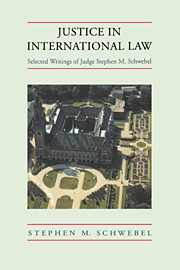Book contents
- Frontmatter
- Contents
- Preface
- PART I International Court of Justice
- PART II International Arbitration
- PART III United Nations
- 15 The Origins and Development of Article 99 of the Charter
- 16 The International Character of the Secretariat of the United Nations
- 17 Secretary-General and Secretariat
- 18 A United Nations “Guard” and a United Nations “Legion”
- 19 Mini-States and a More Effective United Nations
- 20 Article 19 of the Charter of the United Nations: Memorandum of Law
- 21 The United States Assaults the ILO
- 22 Goldberg Variations
- PART IV International Contracts and Expropriation
- PART V Aggression under, Compliance with, and Development of International Law
- List of publications
- Index
20 - Article 19 of the Charter of the United Nations: Memorandum of Law
Published online by Cambridge University Press: 06 November 2009
- Frontmatter
- Contents
- Preface
- PART I International Court of Justice
- PART II International Arbitration
- PART III United Nations
- 15 The Origins and Development of Article 99 of the Charter
- 16 The International Character of the Secretariat of the United Nations
- 17 Secretary-General and Secretariat
- 18 A United Nations “Guard” and a United Nations “Legion”
- 19 Mini-States and a More Effective United Nations
- 20 Article 19 of the Charter of the United Nations: Memorandum of Law
- 21 The United States Assaults the ILO
- 22 Goldberg Variations
- PART IV International Contracts and Expropriation
- PART V Aggression under, Compliance with, and Development of International Law
- List of publications
- Index
Summary
This memorandum contains an analysis of the considerations of law involved in the application of Article 19 of the Charter of the United Nations. Its conclusions may be summarized as follows:
A. The first sentence of Article 19, which provides that a Member in arrears to a specified extent “shall have no vote in the General Assembly”, entails no decision of the General Assembly to suspend a Member's vote; it is mandatory and automatic in effect. The second sentence, which provides that the General Assembly “may, nevertheless, permit such a Member to vote if it is satisfied that the failure to pay is due to conditions beyond the control of the Member,” is permissive in effect.
B. The records of the San Francisco Conference demonstrate the intention of the drafters of the Charter that the application of the first sentence of Article 19 entail no decision of the General Assembly to suspend a Member's vote.
C. The practice of the United Nations confirms the plain meaning of Article 19 and the intention of the Charter's drafters.
D. The fact that a Member is in arrears within the terms of Article 19 is, by established practice, computed and reported by the Secretary-General, or reported by the Committee on Contributions on the basis of the computations of the Secretary-General.
E. Assessments for peacekeeping operations, including those for the United Nations Emergency Force (UNEF) and Organisation des Nations Unies Congo (ONUC), are included in the computation of arrears within the terms of Article 19.
[…]
- Type
- Chapter
- Information
- Justice in International LawSelected Writings, pp. 337 - 363Publisher: Cambridge University PressPrint publication year: 1994



